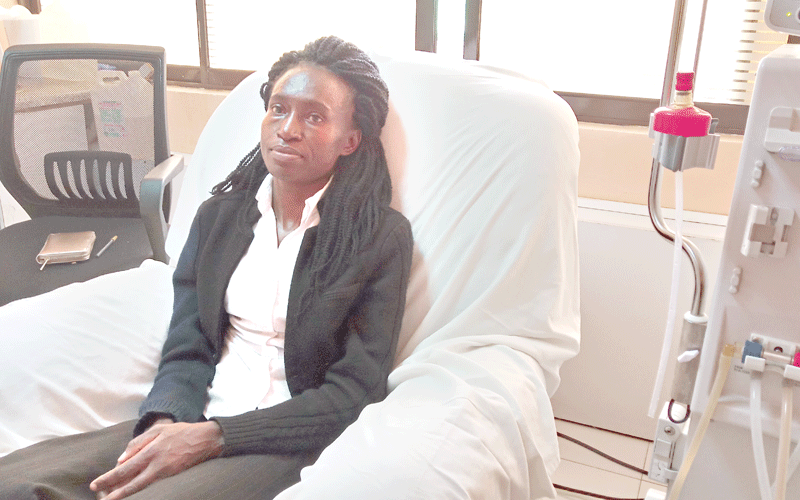Dynamics of work after life-changing medical diagnosis

It’s the hope of every worker that they get positive support from employers in the event of a difficult diagnosis. Unfortunately, there are no guarantees about this. Two women share their unique experiences…
Claire Akinyi once reported to her receptionist job with pride and excitement. That’s before she was diagnosed with chronic kidney disease in November 2015 and her job, which she considered a great source of happiness and contentment came to an abrupt end.
She had worked for a consultant doctor in Nairobi’s Upper Hill area when she began developing health complications.
While six months pregnant with her second baby, Akinyi noticed her eyesight was deteriorating.
But when the problem persisted to the point she could barely see, she decided to visit a doctor.
At the beginning, doctors could not find any link between her pregnancy and eye condition.
But after tests, doctors said both her retinas were swollen hence the poor eyesight. They advised her to take further tests. But the day before the tests, she had a miscarriage.
Letter of termination
All along as she struggled with poor health, she kept this a secret from her employer, often going to hospital early in the morning and late in the evening to ensure she did not skip work.
“My job was everything. Being a single mother, I depended on it to pay my daughter’s school fees, buy food and pay rent.
I also did not want to inconvenience my employer as being away would mean she would be forced to look for a replacement to man the desk,” she says.
The day after the miscarriage, Akinyi freshened up and went to work after spending the better part of the night in hospital.
Ensuing tests attributed the miscarriage to pre-eclampsia—high blood pressure during pregnancy. The condition was also causing the poor eyesight and had damaged her kidneys.

A week later, towards the end of November, Akinyi started dialysis and was put on medication to control the blood pressure.
At this point, Akinyi decided to disclose her health condition to her employer. She needed permission every two days to attend dialysis sessions.
And when the financial toll of the treatment became too much, Akinyi approached her employer for assistance.
Each dialysis session cost Sh7,500. Plus, medication to boost the haemoglobin, anti-hypertensive and iron supplements, the total costs would be Sh20,000 per week. The Sh20,000 was what she was paid monthly.
At the end of January 2016, her employer cut her a fat cheque of Sh70,000. Akinyi was happy to receive the financial boost.
But in a quick turn of events, she received a letter of termination from her employer a week later on the basis she was underperforming due to her illness.
The letter that came with an extra Sh10,000 gave a breakdown on the money she had received earlier outlining that Sh20,000 was her salary plus a two months’ pay in lieu of notice and one month ex gratia.
That marked the end of her job. Akinyi who is still going for weekly dialysis sessions, says she has since moved on, but regrets one thing…
“Had I known my employer would eventually sack me, I would not have struggled so much to keep the job at the expense of my personal health.”
She opted not to take legal action, but to accept the decision though she felt it was unfair.
But the case was different for Anjlee Ghadhvi. “It will be fine,” Anjlee remembers how comforting and relieving it was to hear these words from her boss.
Anjlee, an anchor at K24 TV had just informed the company’s Human Resource Director about her liver cancer diagnosis.
The diagnosis had shocked her. She had experienced pain in her abdomen while expectant with her second born child in 2014, but initially brushed it off.
When the pain persisted, doctors conducted a scan and detected a tumour. “At this point, doctors were not sure about the exact diagnosis. Besides, we had to wait until I delivered,” she says.
After her delivery, she underwent further tests that revealed liver cancer. She flew to India for specialised treatment where doctors told her the best treatment option to get rid of the tumour was a liver transplant.
It would take about a year as Anjlee waited to find a donor who was a match.
During this period, she endured a surgery in India to remove the tumour and slow its growth then later underwent intense chemotherapy sessions.
The treatment required that she stays away from work for long time and since she had resumed work after her maternity leave, Anjlee figured she had to keep her employer on the know about what was going on.
“I kept the news in the hush for sometime. Later, I told my bosses, and some few friends,” she says.
What struck Anjlee was how accommodative and understanding her bosses were about her condition.
She admits through that difficult period some of them turned into close friends who called regularly to check on her when she was away for treatment and assured her all would be ok.
Little things that mattered
In the light of her diagnosis and the treatment demands that came with it, Anjlee and the company quickly came up with an arrangement.
The company would allow her time off to go for treatment whenever she needed to and she would only report to work, when she felt better.
“Cancer treatment is no joke. You suffer severe fatigue, pain from the multiple injections and incur scars in the body,” she says.
But in between treatment, Anjlee would make a point of reporting to work, the severe side-effects of the treatment notwithstanding.
“I love my job and working during treatment gave me something to look forward to.
Any person going through cancer treatment will tell you that it’s such little things that heal us and keep us going.
To take my job away would be robbing me of my instinct to survive,” she says.
For about a year, the news about her diagnosis was kept low, with the charming anchor appearing on the K24 screens as if all was well.
It’s only in 2015, when Anjlee had exhausted her finances and needed more to get a liver transplant in India that she went public about it.
Through K24 sister station Kameme FM, radio presenter Njogu Wa Njoroge na Nyawira mobilised Kenyans and Sh8 million was raised towards her treatment in 2016.
Overwhelming support
For some months after the treatment, Anjlee was hopeful the cancer had gone into remission.
Then doctors discovered it had metastasised into the lungs. She has been undergoing intense radiotherapy to treat it. “Since last year, I have undergone three cycles of radiotherapy.
The treatment is harsh and painful. At times it causes irritation on my throat among other side-effects. There are times I have gone on screen and read news despite the irritation,” she says.
After her liver transplant, Anjlee was put on immunosuppressant drugs, which make the body less likely to reject a donated organ also have the effect of weakening the immunity.
At work, she works in secluded spaces to avoid being exposed to infections. The company also allows her the liberty to work from home whenever necessary.
She considers herself fortunate to have an employer and colleagues who have supported her during one of the most difficult seasons in her life. For that, she says, the best way she can pay back the kindness, is by doing her level best in her work.
“I feel touched by the overwhelming love and support. I hope that when people see me living my life with courage and strength, they will feel encouraged despite the difficult circumstances they may be going through,” she says. Anjlee who had taken a break from anchoring, hopes to be back on the K24 screens soon.












